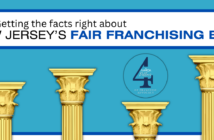What is a franchisor’s obligation to deal with its franchisees in good faith?
Many franchise agreements provide limited (if any) commitments on the part of the franchisor to deal with its franchisees in good faith or in a commercially reasonable manner. Instead, franchisors commonly reserve the right to act, and make decisions, with practically unlimited discretion (i.e., sole discretion). When it comes time for franchisees to obtain their franchisor’s consent, either as it pertains to a renewal or to a proposed transfer, or to adhere to the franchisor’s unreasonable demands, many franchisees feel as if they have no choice but to accede to their franchisor’s unreasonable demands or potentially be left in the perilous situation of being subject to termination.
Common instances throughout the franchise relationship in which franchisors seek to act unreasonably in exercising discretion include: (1) seeking to impose a prohibitively expensive system-wide update/renovation requirement; (2) designating a system-wide requirement to update to a new computer POS system (that, potentially, one of its affiliates created and thereby directly generates revenue from franchisees); (3) designating one of its affiliates as the sole approved supplier for products and services necessary to operate the franchised business (and attaching unreasonable mark-ups on such required products and services to be purchased); (4) selling items in competition with its franchisees to expand the system and generate more profit (for the franchisor); (5) electing to terminate a franchisee; (6) electing to renew, or not renew, a franchisee; and/or (7) electing to approve, or disapprove, a proposed transfer of a franchisee’s franchise.
ACTION PLAN
When faced with such instances, franchisees should be adamant in ensuring the franchisor is dealing with them in a manner consistent with the contract-in-law principle of “good faith and fair dealing.”
The judge-made law (called “the common law”) in essentially every state will typically impose a covenant of good faith and fair dealing in every contract to effectuate the reasonable expectations of the parties to the agreement. This covenant commonly applies to a franchisor-franchisee relationship, and a franchisor may be held liable for a violation of the covenant.
While different courts in different states define the covenant differently, simply put, the “covenant includes subjective and objective elements, both of which must be satisfied. The subjective element ‘prohibits one party from acting to deprive the other of the benefit of the contract.’ The objective element requires each party to act ‘in a manner that a reasonable person would regard as fair.” Anchorage Chrysler Ctr., Inc. v. DaimlerChrysler Motors Corp., 221 P.3d 977, 992 (Alaska 2009).
When determining whether to assert a cause of action based on the implied covenant of good faith and fair dealing, and how best to do so, it is important to consult the applicable state’s law designated in the applicable franchise agreement, as some states require that the covenant be alleged either as an entirely separate cause of action or as an element tied to a claim.
The covenant of good faith and fair dealing also is frequently incorporated into franchise agreements as a separate “good faith” contract provision, generally located toward the end of the franchise agreement. However, many franchisees might be surprised to know that such “good faith” provisions are commonly one-sided, e.g., they are drafted in a way that only requires that the franchisee deal with the franchisor in a manner consistent with the covenant of good faith and fair dealing, but they do not expressly provide a reciprocal obligation on the part of the franchisor to deal with the franchisee in a manner consistent with the covenant of good faith and fair dealing.
If a franchisee is faced with signing a new franchise agreement, either upon renewal or as a condition of obtaining an additional unit, the franchisee should seek to have the franchise agreement altered so that it includes a mutual good-faith requirement. For example, “The parties to this relationship agree to deal with each other honestly, fairly, in good faith, and in a non-discriminatory, commercially reasonable manner.”
While many franchisees hope they’ll never have a dispute with their franchisor, the reality is that disputes do happen. When they do, franchisees should be unwavering in their position that the franchisor is obligated to deal with them in a manner consistent with the covenant of good faith and fair dealing.






